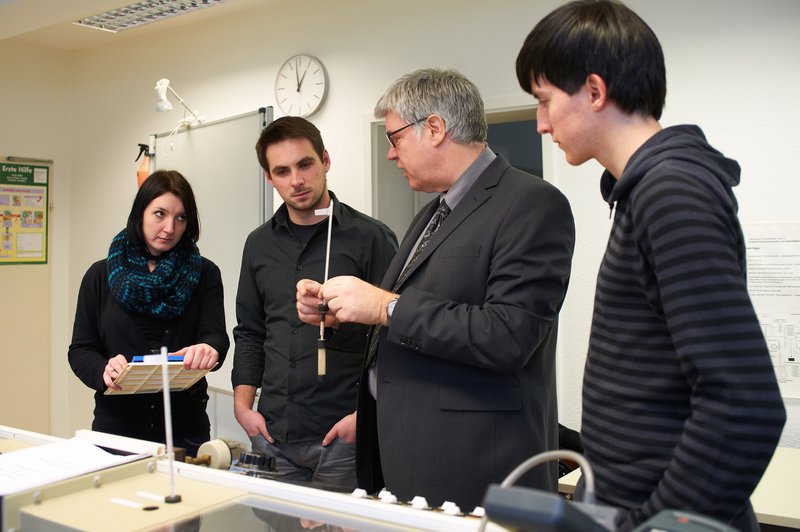
Energy Efficient Building Design
In a Nutshell
Profile
Only when looking at the entire "life cycle" of a building - from planning, construction, and operation to demolition and disposal of the materials - is ecological and economic operation possible. The planning and renovation of buildings is significantly based on well-founded physical and technical building consulting concerning heat and noise insulation, ventilation, passive and active solar energy use, and technical equipment. The trend towards passive, zero, or plus energy building significantly defines building concepts today as much as do the architecture and structural planning. The branch of study of Energy Efficient Building Design in the civil engineering program is thus very future-oriented. It supplements the traditional civil engineering and architecture programs with the modern know-how of sustainable and energy-efficient building.
Practical Training
Basic internship
A 12-week construction site internship is integrated into the program in which the students work hands-on on the site and get to know everyday work there. It must be completed in a non-lecture period. We recommend completing at least part of the internship before the program starts. Subject-specific vocational training and proof of practical work before the start of the program can be counted towards the degree.
Required internship
The required internship usually takes place in the fifth semester of the program. It spans a contiguous period of 20 weeks. Of this, 18 weeks are pure full-time practical training and 2 weeks of courses to accompany the internship. In the required internship semester, students work on construction, planning, consulting, and construction operation tasks based on specific tasks in construction companies, architecture, engineering, and expert firms and/or agencies. They gain insights into technical and organizational contexts in businesses, firms, and/or agencies as well as on construction sites. The university has good contacts with businesses and will help students find a suitable internship position.
Structure of the Program
The program starts with two theoretical semesters that convey technical engineering foundations. The basic internship is also integrated here to ensure early contact with the practical world. The program includes the following subjects in this stage:
- Mathematics and mechanics
- Statics and structural engineering
- Construction, rendering, and CAD
- Materials science and construction chemistry
- Building physics
- Urban water management and construction surveying
- Foundations of sustainable building
At the end of this program segment, students can also change to the "Civil Engineering B.Eng.” branch of study.
In the third and fourth semesters, students dive into their specialization branch of study and acquire well-founded technical know-how. This phase covers subjects such as:
- Construction operations and statics
- Foundations of surveying
- Building energy design of residential buildings
- Measurement and control technology
- Thermodynamics and fluid dynamics
- Building and lighting technology
- Heat and moisture insulation
The fifth semester is a required internship.
The sixth and seventh semester are intended for developing in-depth knowledge. The Bachelor thesis concludes the program.
Curriculum and Examination Regulations
The [program plan]* provides an overview of the structure of the program. The [module manual] describes the contents of the individual subjects. The [study and examination regulations]* form the legal basis for the study program. Contact your academic advisors Dr. Manfred Casties and Dr. Peter Pfrommer concerning the content of the program.
*only available in german at the moment
Einmal im Jahr organisieren die Studierenden auf dem Campus Design die Werkschau "Campus.Design Open". Sie zeigen ihre Werke aus den vergangenen Semestern. Außerdem gibt es öffentliche Lehrveranstaltungen, Workshops, Vorträge, Führungen durch die Gebäude, Musik und noch so manches mehr ...
External content
Job Perspectives

This degree grants student access to an innovative field of work with great career opportunities. The ever increasing requirements for the energy efficiency of buildings also drives the need for more experts who feel at home in the field of building physics and innovative building technology, for consulting, planning, certification, and not lastly for construction management.
Graduates can work as self-employed consulting engineers or can work in planning and engineering firms, the construction and real estate trade, public agencies, or various research institutions since they are looking for experts in energy-efficient building, building technology, and building physics. The program vests students with the ability to issue energy certificates and provide building energy consulting.
Master's degree
After completing the Bachelor’s degree, good graduates have the possibility of obtaining further qualifications with a Master's degree in "Sustainable Planning and Design M.Eng.". In cooperation with Bamberg University, Coburg University also offers a Master’s in "Heritage Sciences M.A." and "Digital Technologies in Heritage Conservation M.A.".
Application and Admission Requirements
Here you can find all the important information about evaluating your school-leaving certificates and learning German in order to start a bachelor program at the University of Coburg.
Since the program is taught in German, you also have to prove your knowledge in German before the start of studies (level C1/C2).
